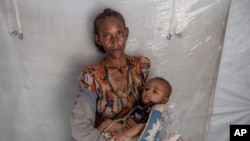International aid groups said Friday that at least four staff members have been killed in the conflict in Ethiopia's Tigray region, while Ethiopia and a frustrated United Nations aired differing views on a growing humanitarian crisis as food and other supplies run out for millions of people.
The Danish Refugee Council said its three staffers killed last month had worked as guards at a project site. "Sadly, due to the lack of communications and ongoing insecurity in the region, it has not yet been possible to reach their families," it said.
Separately, the International Rescue Committee said it was still working to confirm the events "that led to the death of our colleague" in the Hitsats refugee camp in Shire.
The Tigray region remains largely sealed off from the outside world as worried humanitarian organizations warn of growing hunger, attacks on refugees and dwindling medicine and other supplies more than a month after fighting erupted between Ethiopia's government and the now-fugitive Tigray one after a months-long struggle over power.
"We have hundreds of colleagues on the ground and urgently call on all parties to the conflict to protect all civilians in Tigray," U.N. humanitarian spokesman Saviano Abreu tweeted after the deaths were announced.
Ethiopia's government has made clear it intends to manage the process of delivering aid to Tigray, and it has rejected "interference" as fighting is reported to be continuing despite its declaration of victory. On Friday it said it had begun delivering aid to areas in Tigray under its control, including Shire and the Tigray capital, Mekele, a city of a half-million people.
"Suggestions that humanitarian assistance is impeded due to active military combat in several cities and surrounding areas within the Tigray region is untrue and undermines the critical work undertaken by the National Defense Forces to stabilize the region from the attacks waged by the belligerent clique," Abiy's office said. Sporadic gunfire, it said, "need not be misconstrued as active conflict."
The Ethiopian and Tigray governments each regard the other as illegitimate, the result of months of growing friction since Prime Minister Abiy Ahmed took office in 2018 and sidelined the once-dominant Tigray People's Liberation Front.
Thousands of people, including civilians, are thought to have been killed in the fighting, which began Nov. 4 and has threatened to destabilize the Horn of Africa. Some 6 million people live in Tigray, and about 1 million are now thought to be displaced.
The impact on civilians has been "appalling," the U.N. human rights chief said this week.
The International Rescue Committee called for an immediate cease-fire by all parties after "an intense bout of conflict."
The aid group works to assist 96,000 refugees from Eritrea who shelter in camps near the border with that reclusive country. Food in those camps reportedly ran out days ago, and thousands of the refugees have left in search of help.
Frustration among humanitarian groups is widespread as supply-laden trucks have waited for weeks at the Tigray borders. Ethiopia's government says it is responsible for ensuring the security of humanitarian efforts — though the conflict and related ethnic tensions have left many ethnic Tigrayans wary of government forces.
The United Nations has stressed the need for neutral, unfettered access to a region where fears of ethnic tensions remain high.
"Food rations for displaced people in Tigray have run out," the U.N. humanitarian office tweeted Friday. "We reiterate our urgent call for unconditional and safe humanitarian access to the affected regions. People in need are still not able to access any assistance."
This week, Ethiopia's government said its forces shot at and briefly detained U.N. staffers conducting their first security assessment in Tigray, a crucial step in delivering aid. Ethiopia said the staffers had broken through checkpoints in an attempt to go where it wasn't allowed.
Meanwhile, nearly 50,000 Ethiopians have fled to Sudan as refugees and now live in strained conditions in a remote region with few resources.
Aid Groups Say Staffers Killed in Ethiopia's Tigray Conflict




